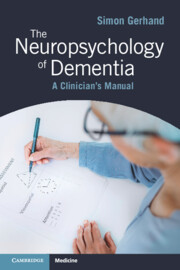Book contents
- The Neuropsychology of Dementia
- The Neuropsychology of Dementia
- Copyright page
- Contents
- Preface
- Acknowledgements
- Section 1 Essential Background Knowledge
- Section 2 Diagnosing Different Types of Dementia
- Section 3 Intervention
- Chapter 10 Cognitive Rehabilitation
- Chapter 11 Pharmacological Interventions
- Chapter 12 Reducing Risk Factors for Mild Cognitive Impairment and Early Dementia
- Section 4 Recent Developments/Contemporary Issues
- Index
- References
Chapter 10 - Cognitive Rehabilitation
from Section 3 - Intervention
Published online by Cambridge University Press: 25 October 2024
- The Neuropsychology of Dementia
- The Neuropsychology of Dementia
- Copyright page
- Contents
- Preface
- Acknowledgements
- Section 1 Essential Background Knowledge
- Section 2 Diagnosing Different Types of Dementia
- Section 3 Intervention
- Chapter 10 Cognitive Rehabilitation
- Chapter 11 Pharmacological Interventions
- Chapter 12 Reducing Risk Factors for Mild Cognitive Impairment and Early Dementia
- Section 4 Recent Developments/Contemporary Issues
- Index
- References
Summary
This chapter reviews strategies for maximising the level of function of people with cognitive impairment. The chapter focuses on a number of strategies, often developed for working with acquired brain injury, such as the use of internal memory aids (e.g. mnemonics, chunking) and external memory aids (e.g. diaries, mobile phones, white boards). Cognitive training exercises and cognitive stimulation are reviewed, along with the evidence base for their effectiveness.
Keywords
- Type
- Chapter
- Information
- The Neuropsychology of DementiaA Clinician's Manual, pp. 131 - 138Publisher: Cambridge University PressPrint publication year: 2024

